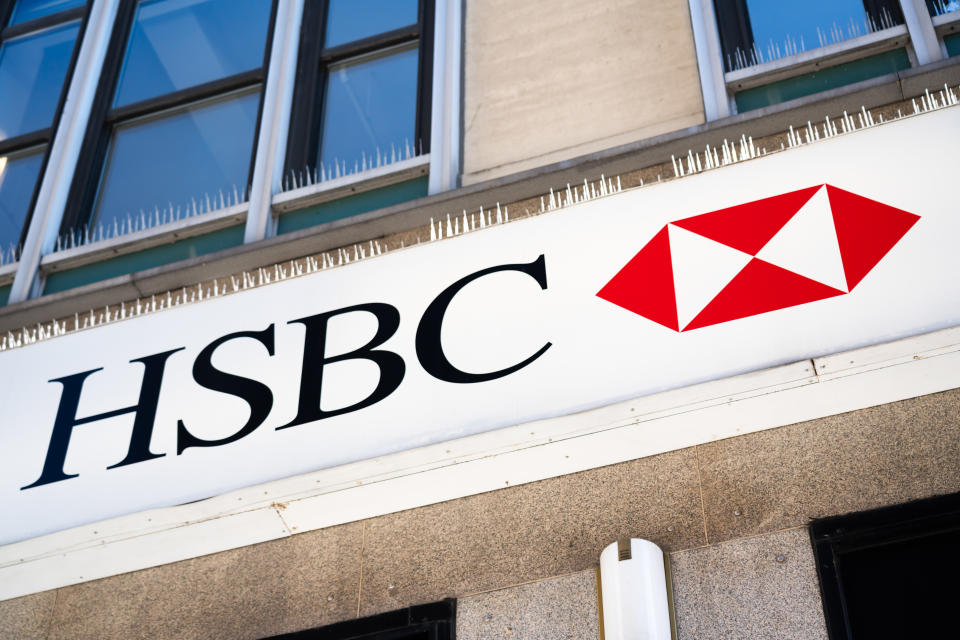What to watch: HSBC feels coronavirus impact, Lufthansa rescue, oil falls

Here are the top business, market, and economic stories you should be watching today in the UK, Europe, and abroad:
HSBC sets aside $3bn as credit losses expected to soar
HSBC (HSBA.L) has paused lay offs and set aside $3bn (£2.41bn) to cover an expected surge in bad loans, as the bank feels the impact of the COVID-19 pandemic.
HSBC said on Tuesday it set aside $3bn in the first quarter of 2020 to cover expected credit losses. That marked a huge surge from the $585m set aside in the same quarter last year and was far higher than analysts had expected.
The bank said it would likely have to set aside even more money to cover expected losses as the COVID-19 pandemic continues and could end up reserving $7bn to $11bn to cover credit losses in 2020 if the pandemic persists. HSBC warned profits will be “materially lower” this year as a result.
The surge in loss provisions caused quarterly profits to almost halve at the bank. Pre-tax profit dropped 48% in the first quarter to $3.2bn.
“The economic impact of the COVID-19 pandemic on our customers has been the main driver of the change in our financial performance since the turn of the year,” said Noel Quinn, chief executive of HSBC.
German government agrees on €9bn Lufthansa rescue
The German government has agreed to extend a €9bn (£7.8bn, $9.7bn) lifeline to Lufthansa (LHA.DE) after the airline requested state aid to survive the economic fallout from the coronavirus pandemic.
According to Business Insider, which was the first to report the news (link in German), Lufthansa sources said that the government agreed the rescue package in return or one or two supervisory board mandates and a blocking minority.
The news outlet said that Lufthansa chief executive Carsten Spohr would meet German chancellor Angela Merkel and finance minister Olaf Scholz today to formally sign off on the package.
According to a report in Switzerland’s Tages-Anzeiger newspaper, Lufthansa subsidiary Swiss Airlines will receive a government-backed loan to the amount of CHF 1.5bn (£1.2bn, $1.5bn).
The exact details of the rescue package are expected to be published on Wednesday this week.
BP keeps dividend despite profits sliding 66%
BP (BP.L) saw its profits slide by 66% in the first quarter of the year, as its CEO warned the coronavirus had caused oil supply and demand shocks “on a scale never seen before.”
With the sector reeling from a collapse in global demand, BP saw its preferred measure of underlying replacement cost profit tumble to $791m in the first quarter, down from $2.36bn a year earlier.
Without an adjustment for “non-operating” items and fair value accounting, it slid to a $628m loss, down from a $2.1bn profit in the first quarter of 2019.
BP still announced it would go ahead with a payout to shareholders in June, announcing a dividend of just over $0.10 per ordinary share, up 2.4% on the previous year.
Many other companies have scrapped or lowered dividends in the wake of the pandemic.
30,000 jobs could be lost in UK oil and gas industry
Up to 30,000 jobs could be lost in the UK’s offshore oil and gas industry as a result of the coronavirus pandemic, a leading representative body warned on Tuesday.
OGUK, the industry’s main trade association, said that a “dramatic reduction” in revenue raised serious concerns about the ability of some firms to survive the downturn.
The body said that the downturn was likely to be more severe than that seen in the wake of the 2015 oil price crash, which threatened the future of the North Sea oilfields.
Noting that many areas of the supply chain were “increasingly fragile,” OGUK said that revenues and margins across the sector could fall by as much as 30%.
European markets rise as oil traders fret about storage
European stocks rose slightly on Tuesday as traders assessed continued panic about oil storage capacity during the coronavirus crisis, which has prompted another fall-off in crude oil prices.
June West Texas Intermediate futures (CL=F) were down 19.64% to $10.27 per barrel, as fears grew that an excess in supply could overwhelm storage facilities and force the price of oil futures into negative territory once again.
At $19.37 per barrel, Brent crude (BZ=F) was trading more than 3% lower on Tuesday.
After opening flat, the pan-European STOXX 600 index (^STOXX) was 0.7% in the green. London’s FTSE 100 (^FTSE) rose by around 0.5%.
Germany’s DAX (^GDAXI) climbed by around 0.6%, while France’s CAC 40 (^FCHI) was up by around 0.3%.
What to expect in the US
Futures were pointing to a higher open for US stocks on Tuesday.
S&P 500 futures (ES=F) rose by more than 0.3%, Dow Jones Industrial Average futures (YM=F) rose by more than 0.4%, while Nasdaq futures (NQ=F) were around 0.5% in the green.

 Yahoo Finance
Yahoo Finance 
